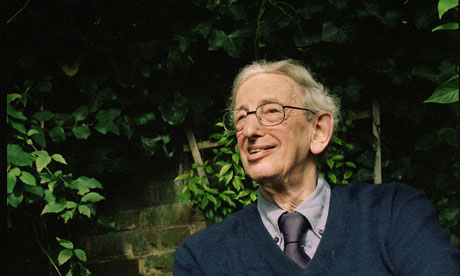Hobsbawm’s Fractured Times: exploring of a world in a crisis of identity

Eric J. Hobsbawm
At the end of March, the last book of the famous British Marxist historian Eric J. Hobsbawm (1917-2012), Fractured Times: Culture and Society in the 21st Century was finally published. Hobsbawm died on October 1st, 2012. In contrast to his previous works, Fractured Times is not a single cohesive history or argument, but rather a collection of bits and pieces taken from Hobsbawm’s essays, scraps and leftovers cobbled together from public lectures and previously published articles.
Hobsbawm’s Fractured Times“is, chiefly, about failure”, Alex Massie wrote for the The Telegraphon March 27th—“the failure of power, the failure of art and the failure of modernity.” Massie points to the sheer breadth and diversity of the book’s 22 sections, which, he describes “roam from a consideration of the fate of the German Jews to the boundless appeal of the American cowboy,” in between touching on “religious revivalism, the role of intellectuals and science in a modern society and much else.” The author’s meandering focus serves simply to reinforce his premise that history has come unhitched from its moorings, Massie alludes, though he ultimately finds Hobsbawm’s “elegiac feeling” far too dour. Whatever the historian’s misgivings about humanity’s insecure identity in the new century, Massie reminds readers that there is much to be celebrated in terms of material and diplomatic progress.
In a rather more detailed review published in Times Higher Education two weeks later, Roger Morgan, finds a more satisfying conclusion emergent from varied collection. “The titles of Hobsbawm’s books are always well chosen,” the former professor of political science at Florence’s European University Institute, notes. “When Hobsbawm issued his magisterial four-volume history of the world from 1789 to the 1990s, he was confident of being able to summarize each epoch in a word: The Age of Revolution, The Age of Capital, The Age of Empire, The Age of Extremes…Fractured Times explores a world beset by the multiple contradictions of globalization, a society preoccupied by awareness of…an ‘identity crisis’.”Morgan implies that the title of the present work is a reflection of these insecurities. Hobsbawm has no easy answers for those asking questions about humanity’s current direction, he maintains, quoting the author’s sordid diagnosis that we are in “‘an era of history which has lost its bearings, and which in the early years of the new millennium looks forward with more troubled perplexity than I recall in a long lifetime, guideless and mapless, to an unrecognizable future.’”
In contrast to Massie though, Morgan finds more to praise in Fractured Times, devoting a considerable portion of his review to tracing Hobsbawm’s career preoccupation with what he considered the enduring but vestigial remnants of bourgeois culture. “Hobsbawm’ s own generation was ‘brought up in the framework of a culture made by and for the nineteenth-century bourgeoisie’: a culture that defined the rules and conventions of opera houses, art galleries, architecture and literature,” Morgan writes. “Hobsbawm sees a major cause of our present troubles thus: this bourgeois society ‘vanished with the generation after 1914, never to return’, but some of its cultural norms survive.”
Where the historian’s long-held dedication to a Marxist viewpoint initially found form in a conviction that bourgeois capitalism would give way to socialism. “The fact that this failed to happen, and that bourgeo is society—at least some of its essential aspects—survived, to be confronted by challenges from a new and unexpected set of socio-economic forces,” Morgan explains, “appears to have led Hobsbawm to a new conclusion: that since this society ought to have disappeared, its cultural tastes and usages, although apparently surviving, must in reality be mere posthumous mirages, doomed in time to vanish.”Here, in his final work, Morgan says the author sees a potential final severing coming from three sources:“first, ‘the twentieth-century revolution in science and technology, which transformed old ways of earning a living before destroying them’; second, ‘the consumer society generated by the explosion in the potential of the Western economies’; and third, ‘the decisive entry of the masses on the political scene as customers as well as voters’ - an innovation that means that ‘with the democratization of power, power increasingly became public theatre’.”
By no means does that mean all is well and done though. For Hobsbawm, “this amounts to an apocalyptic array of challenges, and indeed we do appear to have entered a society in which ‘a techno-industrialized economy has drenched our lives in universal, constant and omnipresent experiences of information and cultural production - of sound, image, word, memory and symbols’.”In this information-and-representation-saturated environment, “the traditional individual appreciation of ‘art’ gives way to what the sociologist David Riesman described more than 60 years ago as the ‘other-directed’ conformism of a ‘lonely crowd’. In Hobsbawm’s view, it means that “the arts” lose the privileged status they had enjoyed in the old bourgeois society, ‘their function as measures of good and bad, as carriers of value: of truth, beauty and catharsis’,” Morgan concludes.
The Chinese version appeared in Chinese Social Sciences Today, No. 439, Apr. 15, 2o13
Edited by Zhang Mengying

 PRINT
PRINT CLOSE
CLOSE